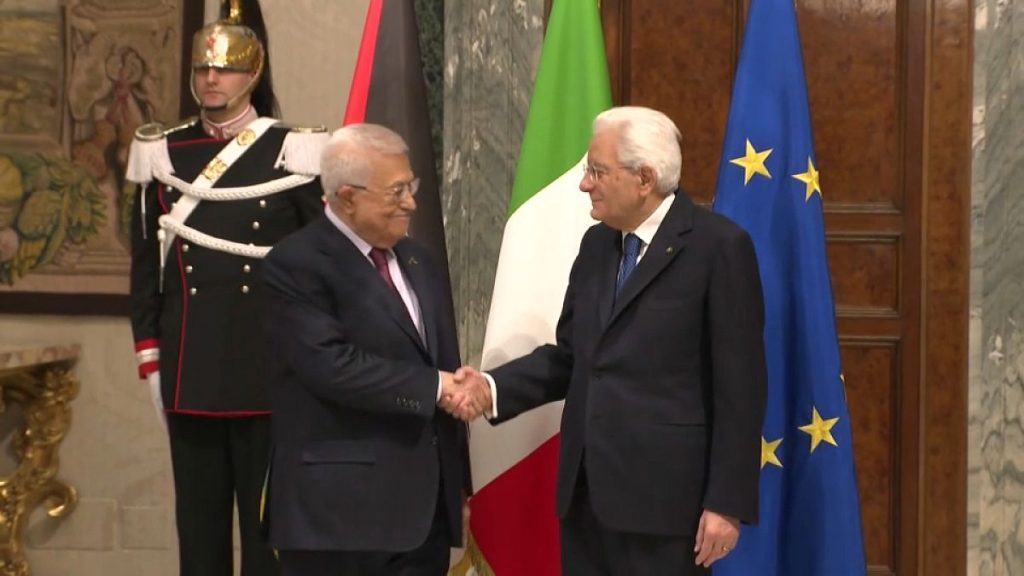Palestinian President Mahmoud Abbas embarked on a diplomatic mission to Italy, engaging in high-level discussions with Italian President Sergio Mattarella and Pope Francis to address the escalating tensions in the Middle East, particularly the precarious situation in the Palestinian territories. President Mattarella expressed grave concern over the escalating violence in the West Bank and East Jerusalem, attributing the unrest to the continued expansion of Israeli settlements, which contravene established United Nations resolutions and exacerbate tensions between Israelis and Palestinians. He reiterated Italy’s unwavering support for a two-state solution as the only viable path towards achieving lasting peace in the region, emphasizing the imperative of establishing two independent states for Israelis and Palestinians, respectively. President Mattarella underscored that without a concrete prospect of a two-state solution, the cycle of violence would persist, further destabilizing the region. He also emphasized the crucial role of the Palestinian Authority in maintaining stability following the cessation of hostilities in Gaza, advocating for its empowerment in the post-conflict reconstruction and governance processes.
Concurrently, Pope Francis engaged in separate meetings with both President Abbas and Lebanese caretaker Prime Minister Najib Mikati, focusing on the humanitarian crises unfolding in their respective regions. During his meeting with Prime Minister Mikati, the Pope reiterated the Vatican’s steadfast commitment to Lebanon, characterizing the nation as a symbol of hope and resilience in a turbulent region. He stressed the importance of unity among Lebanese officials in confronting the multifaceted political and economic challenges besetting the country. Lebanon is grappling with the aftermath of a devastating conflict between Hezbollah and Israel, which resulted in widespread displacement and extensive damage to infrastructure. The World Bank estimates the cost of damages and losses incurred during the conflict to be a staggering €8.1 billion, underscoring the magnitude of the reconstruction efforts required.
President Abbas’ meeting with Pope Francis centered on the dire humanitarian situation in Palestine. Abbas appealed to the Pope to continue his advocacy for the international recognition of a Palestinian state, emphasizing the vital role of the Vatican in promoting peace and justice in the region. The discussions between Abbas and the Pope underscored the urgent need for international intervention to address the deteriorating conditions in the Palestinian territories. The Pope’s engagement with both Abbas and Mikati highlights the Vatican’s deep concern over the interconnected crises affecting the Middle East and its commitment to fostering dialogue and reconciliation in the region.
The diplomatic efforts undertaken by President Abbas, coupled with the Vatican’s active involvement in mediating dialogue and advocating for peaceful resolutions, underscore the international community’s growing recognition of the urgent need to address the complex and interconnected crises afflicting the Middle East. The emphasis on a two-state solution as the cornerstone of any lasting peace agreement between Israelis and Palestinians remains a central theme in these diplomatic endeavors. The international community faces the formidable challenge of translating these diplomatic efforts into concrete actions that can bring about tangible improvements in the lives of Palestinians and contribute to a more stable and secure future for the region.
The interconnected nature of the crises in the Middle East, exemplified by the spillover effects of the conflict between Hezbollah and Israel on Lebanon’s already fragile political and economic landscape, highlights the urgency of addressing the root causes of instability in the region. The international community must move beyond mere expressions of concern and actively engage in facilitating a comprehensive and sustainable resolution to the Israeli-Palestinian conflict, which lies at the heart of much of the regional turmoil. Furthermore, the international community must provide substantial support to Lebanon in its efforts to rebuild and recover from the devastating consequences of the recent conflict, addressing the humanitarian needs of the displaced population and investing in long-term development initiatives to foster stability and resilience.
The diplomatic engagements of President Abbas and the Vatican’s active role in mediating dialogue and advocating for peaceful solutions represent crucial steps towards addressing the complex challenges confronting the Middle East. However, these efforts must be translated into concrete actions that can bring about tangible improvements in the lives of those affected by conflict and displacement. The international community must demonstrate a sustained commitment to fostering dialogue, promoting reconciliation, and providing the necessary resources to rebuild shattered communities and pave the way for a more peaceful and prosperous future for the region. The pursuit of a two-state solution remains the cornerstone of any lasting peace agreement, and the international community must redouble its efforts to ensure its realization.














